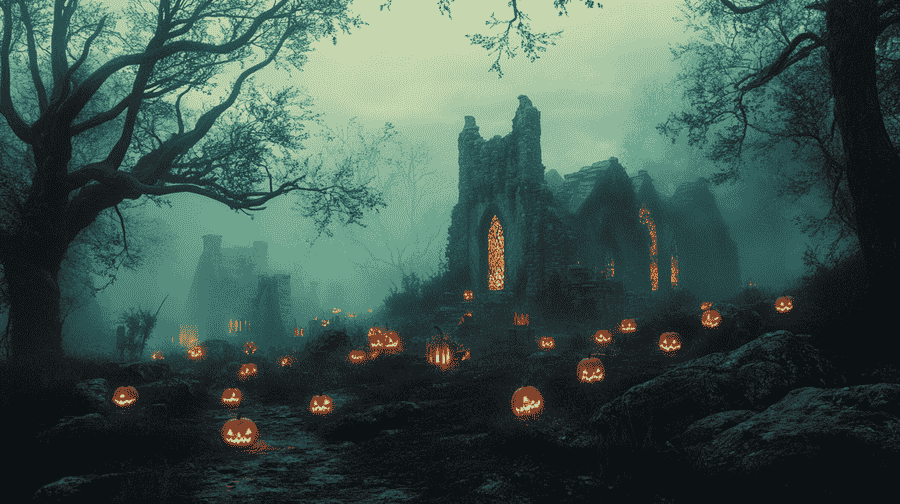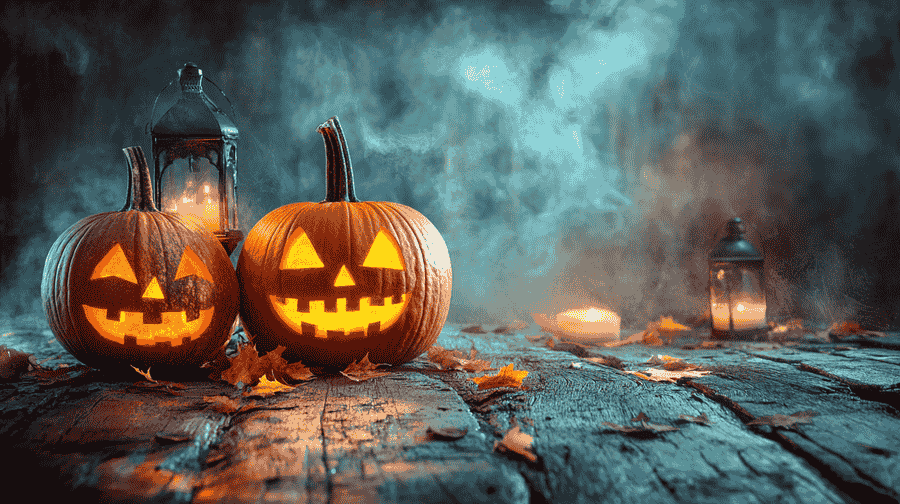Is Halloween A Christian Holiday: The Origins
Halloween’s story goes way back to an ancient Celtic festival called Samhain (pronounced "Sow-in"). This was celebrated over 2,000 years ago in what is now Ireland, Scotland, and parts of Northern Europe. For the Celts, Samhain marked the end of the harvest season and the start of winter. This was a time they believed the boundary between the living and the dead was, well, kind of thin.
During Samhain, people thought spirits could roam the earth. To protect themselves, they’d light bonfires, wear costumes (sound familiar?), and offer sacrifices to ward off any unwanted ghostly visitors. They also carved scary faces into turnips to scare off evil spirits (kind of like the grandparents of today’s jack-o’-lanterns).
When Christianity spread across Europe, church leaders decided to tweak things a bit. They introduced All Hallows’ Eve, the night before All Saints’ Day, to honor the saints and martyrs. Over time, the two traditions (Celtic and Christian) started to mix. The spooky costumes and superstitions stuck around, but they got mashed together with Christian ideas of remembering the dead.
Fast forward a few centuries when Halloween landed in America and it morphed into the holiday we know today. The bonfires turned into front-yard decorations, and instead of warding off spirits, people handed out candy.
 What Does The Bible Say About Halloween?
What Does The Bible Say About Halloween?
Now, let's focus on the subject of this article and get one thing out of the way. The Bible doesn’t talk about Halloween (at least not directly). You can flip through every page and you won’t find any mention of it. That’s because Halloween, as we know it today, didn’t exist when the Bible was written. But that doesn’t mean the Bible has nothing to say about some of the themes Halloween touches on. And by that I mean things like the supernatural, life after death, and how we should approach certain practices.
In the Bible, there are clear warnings about dabbling in things like witchcraft, divination, or trying to talk to the dead. For example, Deuteronomy 18:10-12 says:
Let no one be found among you who sacrifices their son or daughter in the fire, who practices divination or sorcery, interprets omens, engages in witchcraft, or casts spells, or who is a medium or spiritist or who consults the dead. Anyone who does these things is detestable to the Lord.
That’s pretty direct, if you ask us. God didn’t want His people messing around with stuff that could lead them down the wrong path.
Halloween is often associated with spooky, dark imagery, but the Bible teaches us to focus on light and truth. Ephesians 5:11 puts it like this:
Have nothing to do with the fruitless deeds of darkness, but rather expose them.
It’s a reminder to think about the kind of messages or actions we align ourselves with.
Now, does this mean Halloween itself is bad or sinful? Not necessarily. The Bible doesn’t call out Halloween directly, so it’s more about how you approach it. Are you celebrating in a way that aligns with your faith? Or are you engaging in things the Bible warns against? That’s where the real conversation happens.
Get Closer to God Today
4.9
Average Rating
|Over 5 Million Downloads
Why Don’t Christians Celebrate Halloween?
When it comes to Halloween, Christians tend to fall into three camps: some love it, some avoid it like the plague, and others try to find a middle ground.
For a lot of Christians, Halloween is simply a harmless day for costumes, candy, and some good old-fashioned fun. They don’t see it as anything more than a community event where kids can dress up as their favorite characters and enjoy the festivities. These folks often say, "It’s not about the dark stuff; it’s just about spending time with family and neighbors."
On the flip side, there are Christians who completely steer clear of Halloween. To them, the holiday’s roots in pagan rituals and its focus on ghosts, witches, and the occult are just too much. Like 1 Thessalonians 5:22 says:
Abstain from every form of evil.
This is usually their reason for staying out of it. For this group, it’s better to play it safe and avoid anything that could even hint at celebrating things the Bible warns against.
Then there’s the middle ground—Christians who see Halloween as an opportunity to do something positive. Instead of shunning the holiday, they might host “trunk-or-treat” events at their church, where kids can dress up and collect candy in a safe, family-friendly environment. This group takes Halloween and flips it into something that aligns with their beliefs.
So, what’s the right perspective? There’s no one-size-fits-all answer. It really comes down to personal conviction and how you choose to approach it.
Romans 14:5-6 offers some good advice here:
One person considers one day more sacred than another; another considers every day alike. Each of them should be fully convinced in their own mind. Whoever regards one day as special does so to the Lord.
In other words, it’s okay to have different opinions, as long as your actions come from a place of faith and sincerity.
Alternative Christian Celebrations
If Halloween doesn’t sit right with you, that’s totally fine—there are plenty of other ways Christians can mark the season without feeling like they’re compromising their beliefs. Here are a few ideas that some people and churches have embraced as alternatives to the usual Halloween festivities.
1. All Saints’ Day and All Souls’ Day
These two days, celebrated on November 1 and 2, are actually the Christian roots of Halloween (which comes from “All Hallows’ Eve”). All Saints’ Day honors the lives of saints and martyrs, while All Souls’ Day is about remembering loved ones who have passed. Some families or churches use this time to reflect, light candles and pray for those who’ve gone before them. It’s a meaningful way to focus on faith and remembrance instead of costumes and candy.
2. Harvest Festivals
Many churches throw harvest-themed events around Halloween. Think hayrides, pumpkin carving, and games—basically all the fun, minus the spooky stuff. These festivals are often held in the church parking lot or a community center and give families a safe place to celebrate together. It’s less about ghosts and ghouls, and more about gratitude and enjoying the season.
3. Trunk-or-Treat
If you’ve never heard of it, trunk-or-treat is like trick-or-treating, but out of car trunks in a parking lot (usually at a church). People decorate their cars with fun, family-friendly themes—think Bible stories, cartoon characters, or silly ideas like “under the sea.” Kids still get candy, but the whole thing happens in a safe, controlled environment. It’s a great way for families to connect with their community without worrying about anything sketchy.
4. Light Parties
Some churches organize “light parties” as an alternative to Halloween’s darker themes. These events focus on the idea of being a light in the world, drawing from verses like Matthew 5:16, which says:
Let your light shine before others.
Kids can dress up, but the costumes are often based on positive themes—think superheroes, animals, or historical figures. There’s music, games, and plenty of treats, but everything is geared toward celebrating goodness and joy.
Bottom Line
Halloween stirs up a lot of questions, especially for Christians trying to balance their faith with cultural traditions. While the Bible doesn’t specifically mention Halloween, it does offer plenty of guidance on how to approach themes like light, darkness, and the supernatural. Whether you choose to celebrate, avoid, or reimagine Halloween, the key is to make a thoughtful, faith-based decision that aligns with your beliefs.
If you enjoy dressing up and handing out candy, do it with kindness and joy. If you feel uneasy about Halloween’s roots or themes, that’s okay too—there are plenty of meaningful alternatives to explore. What matters most is staying true to your values and remembering that your actions should reflect your faith.
At the end of the day, Halloween is just one day on the calendar. How you choose to engage—or not engage—with it is up to you. Whatever you decide, let it be a reflection of the light, love, and hope that the Bible encourages us to share with the world.











